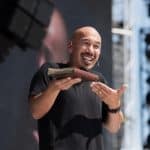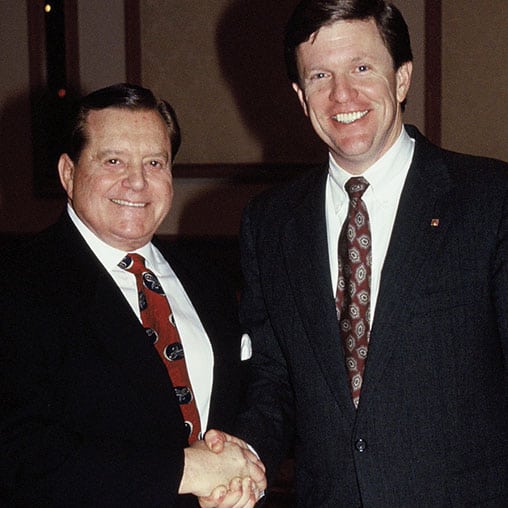
Men Who Marked the Ministry
Hear from the people who directly influenced Dennis Rainey, and consequently the entire ministry of FamilyLife: Josh McDowell, Howard Hendricks, Chuck Colson, and Bill Bright.
Show Notes
About the Host
About the Guest
-
Josh McDowell reminisces about his dad and thanks him for what he did right.
FamilyLife honors Howard and Jeanne Hendricks for over fifty years of love and faithfulness to each other.
Chuck Colson discusses how the only truly good life is found in a relationship with Jesus Christ.
How would you spend your last days on earth? For Dr. Bill Bright, nothing was more rewarding than fulfilling the Great Commission to the very end. -
Dave and Ann Wilson
Dave and Ann Wilson are hosts of FamilyLife Today®, FamilyLife’s nationally-syndicated radio program. Dave and Ann have been married for more than 38 years and have spent the last 33 teaching and mentoring couples and parents across the country. They have been featured speakers at FamilyLife’s Weekend to Remember® marriage getaway since 1993 and have also hosted their own marriage conferences across the country. Cofounders of Kensington Church—a national, multicampus church that hosts more than 14,000 visitors every weekend—the Wilsons are the creative force behind DVD teaching series Rock Your Marriage and The Survival Guide To Parenting, as well as authors of the recently released book Vertical Marriage (Zondervan, 2019). Dave is a graduate of the International School of Theology, where he received a Master of Divinity degree. A Ball State University Hall of Fame quarterback, Dave served the Detroit Lions as chaplain for 33 years. Ann attended the University of Kentucky. She has been active alongside Dave in ministry as a speaker, writer, small-group leader, and mentor to countless wives of professional athletes. The Wilsons live in the Detroit area. They have three grown sons, CJ, Austin, and Cody, three daughters-in-law, and a growing number of grandchildren.
-
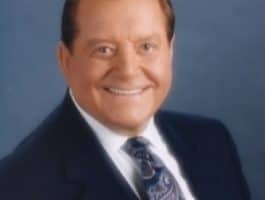
Bill Bright
Bill was considered a major catalyst for the modern-day resurgence of the disciplines of fasting and prayer in the Christian church. Bill co-founded, with Dr. James Davis, the Global Pastors Network, an Internet-based training center designed to equip pastors and ministers worldwide with interactive resources, events, and networking opportunities.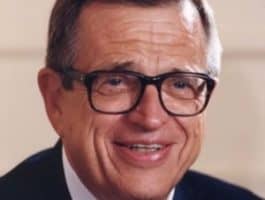
Chuck Colson
Evangelical Christianity lost one of its most eloquent and influential voices on April 21, 2012 with the death of Charles W. “Chuck” Colson. Colson was the founder of Prison Fellowship and Colson Center for Christian Worldview A Watergate figure who emerged from the country’s worst political scandal, a vocal Christian leader and a champion for prison ministry, Colson spent the last years of his life in the dual role of leading Prison Fellowship, the world’s largest outreach to prisoners...more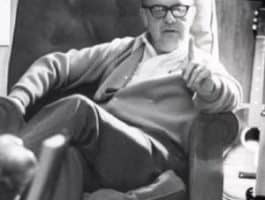
Howard Hendricks
Dr. Howard G. Hendricks, known simply as “Prof,” directly or indirectly touched millions of lives in the evangelical community and beyond. For more than sixty years Prof served on the faculty of Dallas Theological Seminary (DTS), where he taught more than ten thousand students. He also ministered in person in more than eighty countries. Through speaking engagements, radio, tapes, films, the sixteen books he authored and coauthored, countless journal and popular-market articles, his service o...more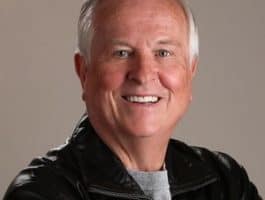
Josh McDowell
A trailblazer for truth and relationships, Josh McDowell has been at the forefront of cultural trends and ground-breaking ministry for over five decades. Josh shares the essentials of the Christian faith in everyday language so that youth, families, churches, leaders and individuals of all ages are prepared for the life of faith and the work of the ministry. This included leveraging resources based on years of experiences, new technologies and strategic partnerships. Since 1961, Josh has d...more
Hear from the people who directly influenced Dennis Rainey, and consequently the entire ministry of FamilyLife: Josh McDowell, Howard Hendricks, Chuck Colson, and Bill Bright.
Men Who Marked the Ministry
Bob: Like a lot of young husbands, Howard Hendricks thought his assignment, early in marriage, was to make sure his wife got repaired / got fixed.
Howard: Finally, one day, it was as if the Lord said to me: “Look, Hendricks, you have your roles mixed up with Mine. You know, it’s My job to change her; it’s your job to love her. So get on doing what God has called you to do.” The interesting thing is—that the moment I stopped trying to change her, she got organized; because there is a basic principle there; and that is, when you accept your partner, then you free them up to change.
Bob: This is FamilyLife Today for Friday, November 10th. Our host is the President of FamilyLife®, Dennis Rainey, and I'm Bob Lepine. Howard Hendricks is just one of the people who has had a profound impact on this ministry by having a profound impact on Dennis and Barbara Rainey’s lives. We’ll hear more about that today. Stay with us.
1:00
And welcome to FamilyLife Today. Thanks for joining us on the Friday edition, the first day of the next quarter century for FamilyLife Today.
Dennis: We have the silver;—
Bob: We’re going for the gold. [Laughter]
Dennis: —we’re going for the gold!
Bob: We hope we have our teeth when the gold gets here.
Dennis: Keith Lynch, our engineer—he re-upped for another 25 years! Work your magic, Keith! [Laughter]
Bob: We’ve been spending time this week celebrating 25 years that FamilyLife Today has been on the air. We’ve done that by listening to some of the voices from the past 25 years—some of the people who have been guests on this program—and kind of reflected on highlights. And today—
Dennis: Before you get to the highlights, I just want to say, “Thank you,” again, to listeners; because we wouldn’t have a broadcast if you didn’t listen.
2:00
We meet you all over the country, and I love to meet you. I tell you exactly what I say to every one of them—“It is good to meet a listener, because Bob doesn’t listen to me while I’m in the studio.” [Laughter]
Bob: It’s not true! That is not true!
Dennis: It is so true. He takes naps, folks. So I’m glad to meet a listener that is actually listening to FamilyLife Today.
Bob: It’s when we leave that I stop listening to you. [Laughter]
Dennis: Oh yes; that really is true!
But anyway, “Thanks for listening”; and then, to the second group—the donors who make this ministry happen—no joke, we could not do what we do if you did not stand with us—those of you who are Legacy Partners, who give monthly; those of you who give once a year, and you give generously; those of you who give sacrificially—we don’t take any of that for granted.
Bob: Right.
Dennis: It’s not sticking to our fingers, I promise you—it’s going right into the homes and hearts of families all over the country and all over the world, actually, through the internet. “Thank you,” for giving and “Thank you,” for caring about other people’s homes—others beside yourselves.
3:00
That’s the kind of people we need today, Bob—who are reaching out and care about others.
Bob: I did a lot of the planning for this week without really talking to you about it, so—
Dennis: That’s correct.
Bob: — like: “What else is new?” [Laughter]
Dennis: You don’t listen; and you don’t talk, either! [Laughter]
Bob: I decided, as we were talking about clips to feature—
Dennis: I think I may just take over someday; you know?
Bob: —I thought we should have a day where we heard from people who have significantly marked your life. The first one was somebody you heard when you were in college; right?
Dennis: All the way back to the Harvard of the Ozarks—the University of Arkansas. I was a student, and Josh McDowell came to the campus. I’m telling you—his emphasis on apologetics and a defense for the faith hit me squarely in the middle of my heart.
Bob: You had come from a family in southwest Missouri, where your mom and dad loved each other and where they were marked by integrity.
4:00
Josh came from a very different family, and that’s part of what he shared with us when he sat down with us on FamilyLife Today.
[Previous Interview]
Dennis: Take us back to your home, as a boy, growing up. What did your relationship with your dad look like?
Josh: Well, we did very few things together. I always felt that I always did things with him with the things he wanted to do and he had to do. He never did things that I wanted to do or wanted him to step into my life. I basically remember him, at a quarter-to-five in the morning every morning, come and get me out of bed and say, “Go out and do the chores,” and then, coming home late afternoon, after football practice to work. He was always drunk / always drunk.
And then, I would just look for him and watch him to go out and find his bottles; because I kept thinking, “If I can destroy his bottles, there’s something that will stop.” I would peek out the windows and see where he’d go hide his booze and drink; and then, I’d, either, go out and destroy or I’d go out and urinate in the whiskey bottles to try to embarrass him / to make him sick. Those are the basic memories that I had.
5:00
Bob: Did you ever sit down with your mom and explain how you felt or your frustrations with your dad?
Josh: No; because I was never given that opportunity. I always feared ever taking the initiative to do that. My mom was a very—you know, I remember her—that without her, I don’t know what I would have done. She was quite a loving woman with us kids. I think she was a good mom; I really do. I think, without that, I would have died; because I remember, when my older brother—my one sister committed suicide—and then, my older brother, Wilmot, tried to sue my parents for every penny they had.
I was just a little kid, and my folks—he was my dad’s favorite kid. I mean, my dad gave him everything; and he’s the one kid that turned on my dad and took him to court to try to get the whole farm—all the cows / everything from him. My dad had built a house for him and everything on the farm—so he was going to move it. I remember my mom and dad said: “Please leave the house here. We need it. We’ll pay you for the house; we’ll build you another.” But out of spite—and I understand why he did it—out of spite, he was moving the house. What he did—he got all—he was a very popular young man in the town / very sharp guy, my oldest brother.
6:00
He got all the townspeople—and, I mean, scores of them—to come out to stand in opposition to my mom and dad around the house when they moved it.
I didn’t know all that was taking place. I was so excited—I couldn’t believe they were going to move this big house! I’d seen them, up there, knocking some things out. Well, the day they went to move it, I got up on a Saturday morning—was all excited / ran up there—and here were all these people up there. Here were all these parents of friends of mine yelling these dirty, filthy things at my dad. I mean, it was like I hit a brick wall. I remember I stopped, and it just shattered me. I ran down the knoll into the barn. I went up to what we used to grind the corn, locked all the doors, and sat in there and cried for hours. At that moment, I walked out—all I wanted to do was kill him at that time. I was so embarrassed that it was the parents of my friends doing that.
Dennis: As you moved through adolescence and then your college years and adulthood, how did that play itself out in your relationship with him?
7:00
Josh: I’d always grown up envying other people’s parents. It was like God said, “Josh, who do you think I’ve used most in your life, whether good or bad, to make you who you are?” I had to admit it was my mother and father, even though my dad was a drunk and everything else. From that moment on, I have never, to this day, envied anyone else’s parents. So, I just said, “God, thank You for my mom and dad.”
[Studio]
Bob: Again, that’s Josh McDowell with a great reminder that God is there in the hard times, and He’s there in the good times, and He is doing all things for His glory and our good.
Dennis: That’s right—Romans 8:28: “All things work together for good to those who love God and are called according to His purpose.” God used his rugged background to mark him, as a man, husband, and father; and he’s a good one.
Bob: God used another man as a mentor in your life—a professor you had when you went to seminary at Dallas Theological Seminary.
8:00
You have always said you majored in Hendricks at Dallas Seminary. Did you go to Dallas because you had heard Prof. speak before, or did you get there and find him there?
Dennis: Well, actually, I cheated and slipped in the back of the class when I was not a student. [Laughter] I went in with other students—I didn’t pay tuition—but I didn’t go that many times. [Laughter]I just confessed this to the President of Dallas Theological Seminary, and I’m on the Board—so they haven’t fired me yet. [Laughter] But I knew Prof. from those days. He had marked me—as a speaker, as a professor, and as a man—and I wanted to go study and get the best of what he had.
Bob: Prof. went home to be with the Lord a few years ago. When we started FamilyLife Today, we asked Prof. and his wife Jean to be guests. We asked them about the early years of their marriage.
[Previous Interview]
Dennis: I want you to take us back to those early years of marriage. Was there a particular time where there was a fork in the road, early, in your marriage?
9:00
Jean: I was typing theses and dissertations to earn some money, and he was working two jobs. He was under a great deal of stress in his life. He came in late one night and said to me, “You must stop typing, because I have to get to bed.” We lived in a house trailer. I was on a roll—it was before the days of computers and electric typewriters—I wanted to keep on typing; and I said: “Just a minute. I need to finish this chapter.”
He said: “Honey, I am so terribly tired. I have to get into bed. Stop right now.” I said, “Wait.” We went on—we clashed. Finally, he said, “I’m the head of this home, and I think you better stop.” [Laugher] He pushed me too far, and I just simply got up and walked out.
Dennis: Hold it—you mean you left the trailer?
Jean: Absolutely.
10:00
Dennis: I want to ask Prof.: “What was going through your mind?”
Howard: I was not thinking—I was sleeping.
Bob: The typing had stopped!
Dennis: You went to sleep?
Howard: Ask her.
Jean: I walked in—he was sound asleep. [Laughter] As I look back on that and I laugh about it—I must confess that it took me years before I would ever tell anybody that story—I was so ashamed of myself. I know, now, what I could have done / what he could have to avoid the situation; but we were childish and immature, like every young couple is, and I decided that he could not push me further than I wanted to be pushed.
Dennis: I don’t hear his responsibility in this thing at any point. What transpired there? I mean, Prof., did you finally confess your own selfishness in letting your young bride walk the darkened streets?
Howard: Yes; I think, finally, I did; but it was a long fuse—[Laughter]—
11:00
—it took a long time for me. You know, I look back and I cannot believe I was so insensitive; but that was a part of the process of growing up.
You know, you ask: “What were the difficult things?” I think, for the first ten years of my marriage, I tried to get Jean organized. Finally, one day it was as if the Lord said to me: “Look, Hendricks, you have your roles mixed up with Mine. You know, it’s My job to change her; it’s your job to love her. So get on doing what God has called you to do.” The interesting thing is—the moment I stopped trying to change her, she got organized; because there is a basic principle there; and that is, when you accept your partner, then you free them up to change.
You know, there are no perfect marriages; because there are no perfect people. Everybody comes into a marriage with a picture of what your partner’s supposed to be, but you don’t marry a picture—you marry a person.
12:00
So, then, you have an option—you either tear up the picture or you tear up the person.
[Studio]
Bob: That’s classic; isn’t it?
Dennis: It is.
Bob: That is classic Howard Hendricks.
Dennis: I just want you, as a listener, to know—if you weren’t taught by him, I’m sorry for you; because I’ve had a lot of teachers in my lifetime—by far, he was the finest educator, instructor, teacher, professor / whatever you wanted to call him. He was an intellectual, and spiritual coach, and my mentor. What a great privilege to know Prof. and Jean Hendricks—who today is doing quite well in Dallas, by the way.
Bob: Jean is; yes.
Dennis: Yes.
Bob: Another man who you named as a mentor—this really happened maybe over the last decade—that you connected with Chuck Colson and had a good relationship with him. He really spoke into your life.
Dennis: Yes; and I was supposed to have a meeting with him in May, the year he died; but he had a more important appointment with the King of kings and Lord of lords.
13:00
He was going to spend a day with me and had agreed to spend a little time mentoring me over the coming years, but I missed out on that; but I had a number of great times with him.
Bob: Some of our listeners probably have never heard of Howard Hendricks, and some may have not heard of Chuck Colson. He served in the Nixon White House, back in the ’60s and early ’70s. He wound up going to prison because of the Watergate break-in and his involvement in that. He came out of prison—God had moved in his heart and his life / his priorities were realigned—he began Prison Fellowship. That ministry continues, today, to minister to prisoners all around the world.
When we had him, here, on FamilyLife Today, he shared about how you can be a special advisor to the President of the United States and still have an emptiness in your heart.
[Previous Interview]
Chuck: I would sit in my office and look out over the beautiful, manicured lawns of south lawn of the White House and think about, “Boy, this pretty good.”
14:00
You know, grandson of immigrants comes to this country, rises to the top, earns a scholarship to college, been a success in everything he’d done; and “Here I am, and what’s it all about?”—I had this incredible period of emptiness.
Then, I went to Boston one day after I left the White House. I went back to my law firm—had a meeting with the president of Raytheon, one of the largest corporations in America; because I was, once again, to be their counsel. I’d been counsel before I went to the White House; and now, I was coming back to be counsel again.
Tom Phillips, the President, just seemed so different. He was calm and he was peaceful, and we had a great conversation. He started asking me about me and my family and how I was weathering Watergate. I said: “Tom, you’ve changed. What’s happened to you?” He said to me, “I’ve given my life to Jesus Christ,”—they were shocking words—but over those next several months, I began to think about that conversation, and wonder what he really meant, and why he was peaceful, and why his personality had changed so dramatically.
15:00
So, in the summer of 1973, in the darkest days of Watergate—world caving in—I went back and spent an evening on his porch of his home, outside of Boston—hot August night—and he witnessed to me. He told me what had happened to him—told me his story / amazing story. He also read to me a chapter out of C.S. Lewis’s book, Mere Christianity, about the great sin—the great sin, pride. It was me Lewis was writing about. I realized my life—I thought was idealistic / I was trying to do all these things for my family / I was trying to serve my country—was all about me, and it was pride. I didn’t give in—he wanted to pray with me, and he led a prayer; but I didn’t.
Dennis: You resisted.
Chuck: I resisted; sure. I’m too proud—big-time Washington lawyer / friend to the President of the United States.
Dennis: You didn’t want to bow to anybody.
Chuck: That’s right. I went out to get in my automobile and started to drive away, and got about 100 yards and had to stop the car—I was crying too hard.
16:00
I called out to God—I said: “Come into my life. If this is true, I want to know You. I want to be forgiven.” That was the night that Jesus came into my life—nothing’s been the same since / nothing can ever be the same again.
Most of our listeners won’t remember Eric Sevareid or Walter Cronkite—but they devoted almost an entire broadcast of CBS news to my conversion. It was bigger news than Watergate, because it was so improbable. The Boston Globe said, “If Mr. Colson can find God and be forgiven, there’s hope for everybody.”
Dennis: And there is.
Chuck: And there is; exactly—my life proves that.
[Studio]
Bob: Again, a remarkable story / a remarkable man, Chuck Colson.
Dennis: You mentioned, at the outset, Bob, perhaps some of our listeners don’t know Chuck. If you’ve not read his book, Loving God—I have to tell you—I just finished a short little book called Choosing a Life That Matters. One of the principles in that book is about loving God, not the world.
17:00
When I was studying and thinking about that, I thought: “Where can I go to do a little research? Where can I go to dip into somebody who has something to say about the subject?” Well, I dusted off a book that goes all the way back almost three decades and read Loving God. I have to tell you—it’s a great book—I commend it to all of our listeners.
Bob: It is appropriate for us to wrap up birthday week by hearing from—[Laughter]
Dennis: Yes; it really is.
Bob: —the man who—we could say he gave birth to this ministry.
Dennis: Oh, yes!
Bob: It wasn’t his idea; but when the idea came along, he got behind it / got onboard. He cheered you on, as a leader of this ministry, from the beginning.
Dennis: Bill Bright was a man of faith / a man of vision. What I like to say about Bill Bright was: “He’s like Mark Twain. Mark Twain—it was said of him: ‘He never met a man he didn’t like.’ Well, Bill Bright never met a ministry he didn’t like.
Bob: Yes.
Dennis: “He was ready to reach the world and whatever it took.”
18:00
Back in 1975/’76 he, along with some other leaders at Campus Crusade for Christ®—now, Cru®—said “Yes,” to starting the Marriage Preparation and Family Emphasis, which is what FamilyLife came from. FamilyLife Today came from that germinating seed, all the way back in ’76.
Bob: Yes.
Dennis: So Bill was a great man and wasn’t afraid to risk something for the kingdom of God.
Bob: We had the opportunity to sit with him for about two-and-a-half hours a few months before he died. If our listeners would like to hear the conversation we had with him, it’s available, online, at FamilyLifeToday.com.
Dennis: It’s another top five out of 6,000 broadcasts.
Bob: In fact, you just gave it to somebody who was walking through here and said, “You have to listen to this.”
Dennis: I did.
Bob: But what we’re going to hear today is not from that interview—it’s actually a phone call that we had with Dr. Bright, as a leadership team.
19:00
FamilyLife’s leadership team was in a meeting; and as a part of that meeting, you called Dr. Bright. He knew that he would not live long, but he pointed us in the right direction.
[Previous Phone Conversation]
Dennis: Well, I know one of the things that you did, early, in your marriage was sign a contract that you really have felt, I believe, really changed the course of your lives together. Would you share with our listeners what that contract consisted of?
Bill: Well, Vonette and I were both very materialistic, even after we were married. I promised her—and I was in business at the time and could fulfill that promise—that we would live in Bel-Air. I knew one of the builders of the Bel-Air homes there. I had dated his daughter, and had swum in his pool, and eaten his food, while he talked to me about Jesus.
As a result, when I proposed to Vonette—in the back of my mind, I had the dream that we’d travel the world—and I just kind of put Vonette on a pedestal, because she was my queen.
20:00
We wanted to live the good life. Then, with the passing of time, we began to realize the truth of what Jesus taught: “Seek first the kingdom of God and His righteousness, and all these things will be added to you. Lay up treasures in heaven; don’t lay them up on earth, where moth and rust corrupt and thieves break through and steal.”
It was a Sunday afternoon, after we’d gone through a time of crisis—another demonstration of my lack of sensitivity to her—we were in our home in the Hollywood Hills. We had resolved the conflict—and I’d asked her to forgive me, and we’d prayed, and reconciliation had been accomplished. In the process, it was as though the Holy Spirit was saying, “Now, I want you, today, to make total, absolute surrender to My control.” Of course, the Lord always did that which pleased the Father, and He is our first example / our model.
21:00
The Apostle Paul referred to himself, in various portions of Scripture—especially Romans, Chapter 1, verse 1—as a slave of Jesus. Of course, apart from the Lord Jesus, Paul is my favorite—every day, I’m inspired by his life and his teachings. We decided that Sunday afternoon that we would become slaves of Jesus. We took sheets of paper to make a list of all the things we wanted out of life—and our appetites, as I mentioned, were pretty luxurious—but on this day, we began to see the futility of anything outside the will of God: “What does it profit a man if he gain the whole world and lose his own soul?” and “What is there that is more important than knowing the presence of the Lord when He said, ‘If you obey Me, I will manifest Myself to you.’?”
That day, we, literally, signed a contract. I’d signed many contracts in the business world; but this was to be the most important of my life, and Vonette’s as well.
22:00
That afternoon, she went into one room and I in another—we got on our knees, and that was the greatest decision we have ever made.
If you’re not yet a believer, will you just simply pray with me?—“Lord Jesus, come into my heart. Forgive my sins. I want to surrender irrevocably the control of my life to You and follow You in whatever You want me to do. I pray this in the wonderful name of Jesus.”
[Studio]
Bob: Well, again, that’s Dr. Bill Bright, who is breathing celestial air.
Dennis: I just want to turn to you, as listeners, and just say: “If you’ve missed Jesus Christ, you’ve missed life. You’ve missed it all.”
23:00
That’s what Bill Bright believed / what we believe—what we share, here, every day on FamilyLife Today. I just want to close this week of celebrating our 25th anniversary of broadcasting, here, on FamilyLife Today with prayer.
Father, we do indeed adore You / give praise to You. We love You; we are grateful to You.
Thank You for the unspeakable privilege of being Your ambassadors, of representing You in a needy world. Thank You, Father, for the listening audience / for all the stations that are partners in helping to declare Your blueprints and the truth about Jesus Christ and how you build a home. Thank You for the listeners. Thank You for the donors.
Thank You, Father, for Bob, Keith, and the rest of the team. We just want to give You the praise and the glory for the privilege / the profound privilege it has been to spend these past 25 years with our listeners. May You be honored in the next 25, if this broadcast continues that long. In Christ’s name we pray; Amen.
Bob: Amen.
Hope you have a great weekend. Hope you and your family are able to worship together in your local church this weekend, and I hope you can join us back on Monday. We’re going to talk to your wife and your daughter on Monday.
Dennis: Not our listeners’—
Bob: No; we’re going to talk to Dennis’s wife Barbara and his daughter, Laura. [Laughter] We’re going to talk about getting the house ready for the holidays—that comes up on Monday. I hope you can be with us for that.
I want to thank our engineer today, Keith Lynch, along with our entire broadcast production team. On behalf of our host, Dennis Rainey, I'm Bob Lepine. We will see you back Monday for another edition of FamilyLife Today.
FamilyLife Today is a production of FamilyLife of Little Rock, Arkansas; a Cru® Ministry.
Help for today. Hope for tomorrow.
We are so happy to provide these transcripts to you. However, there is a cost to produce them for our website. If you’ve benefited from the broadcast transcripts, would you consider donating today to help defray the costs?
Copyright © 2017 FamilyLife. All rights reserved.
1

